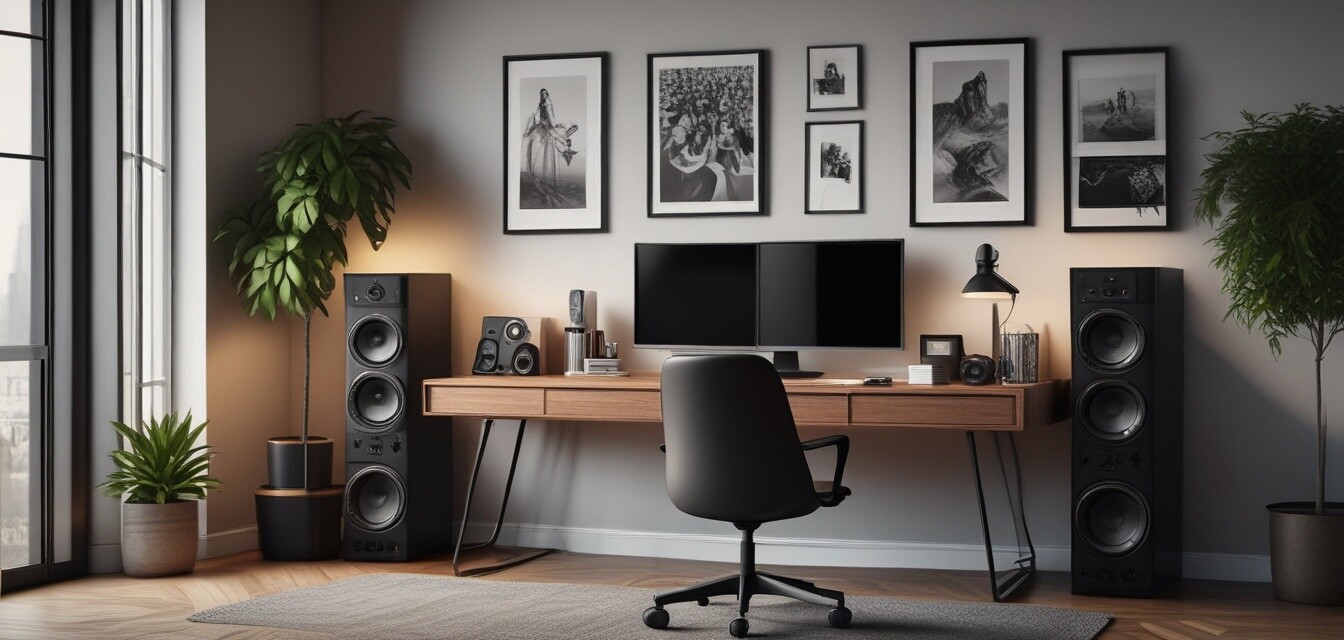
How to Choose the Best Sound System for Your Home Office
Key Takeaways
- Consider sound clarity and audio quality as essential factors.
- Assess the size of your home office before selecting a sound system.
- Connectivity options such as Bluetooth and wired connections matter based on your setup.
- Look for sound systems that offer features tailored for your working needs.
- Finding the right balance between performance and budget is crucial.
Choosing the right sound system for your home office can elevate your workspace, enhance your productivity, and provide an enjoyable environment for both work and leisure. As remote work continues to be part of our lives, investing in a quality sound system is essential. Let’s delve into the critical factors to keep in mind when selecting the best sound system for your needs.
Factors to consider when choosing a sound system
| Factor | Description |
|---|---|
| Sound Clarity | Ensure that the sound system produces clear and distinct audio. This will help you when attending virtual meetings and enjoying music. |
| Size | Consider the space available in your home office. A compact system may be more suitable for smaller areas, while larger setups may be ideal for bigger spaces. |
| Connectivity | Different systems offer various connectivity options such as Bluetooth, USB, or auxiliary ports. Pick one that fits your needs best. |
| Additional Features | Look for features like noise cancellation or sound enhancement to improve the sound quality tailored to your working environment. |
Types of sound systems for home offices
- Bluetooth Speakers: Great for flexibility and portability. They connect wirelessly and are easy to set up.
- Wired Speakers: Usually offer better sound quality and reliability, suitable for stationary setups.
- Soundbars: Ideal for saving space while providing enhanced audio quality compared to built-in speakers.
- Headphones: Perfect for privacy and focus—ideal for remote work scenarios.
Evaluating your space
Understanding your home office layout is paramount. Measure your available space and determine the best type of sound system that would seamlessly fit into your environment.
Consider room acoustics
The acoustics of the room matter significantly. Rooms with hard surfaces may reflect sound, resulting in a less pleasant audio experience. You might want to take into account:
- Carpets or rugs: Help absorb sound more effectively, leading to clearer audio.
- Curtains: Reduce echoing and improve sound quality.
- Furniture arrangement: Can affect how sound travels throughout the room—experimenting with placement may yield better results.
Setting your budget
Establishing a budget can significantly impact your choices. Here’s a breakdown of potential costs:
| Budget Range | System Type |
|---|---|
| Under $100 | Basic Bluetooth or wired speakers with decent sound quality. |
| $100 - $300 | Mid-range systems with better sound performance and additional features. |
| Above $300 | High-end audio systems with superior performance and advanced features. |
Best practices for sound system setup
- Positioning: Place your speakers at ear level and away from walls to avoid distortion.
- Calibration: Many sound systems provide ways to calibrate sound according to your room settings.
- Trial and Error: Don’t hesitate to adjust speaker positions to find the best audio output for your workspace.
- Regular Maintenance: Keep your sound system clean and maintain connections to ensure longevity.
Where to buy your sound system
When it comes to purchasing your sound system, consider checking both online and local electronics stores. Websites that specialize in sound systems can offer competitive prices and reviews to guide your decision.
Conclusion
Selecting the best sound system for your home office involves a careful evaluation of various factors such as sound clarity, size, and connectivity. By assessing your space and needs, and understanding your budget, you can find an audio solution that enhances both your productivity and enjoyment while working. With the right equipment, you’ll create a home office environment that supports your focus and makes your daily tasks more enjoyable.
Tips for Beginners
- Start with a simple compact sound system to understand your needs before upgrading.
- Research customer reviews to find reliable options that suit your budget.
- Take advantage of return policies to test the audio in your workspace.
Pros
- Improved audio clarity enhances meeting experiences
- Customizable setups based on personal preferences
- Can elevate the overall work environment
Cons
- Higher-end systems may not fit all budgets
- Setup can be complicated for certain models
- Ongoing maintenance required for optimal performance